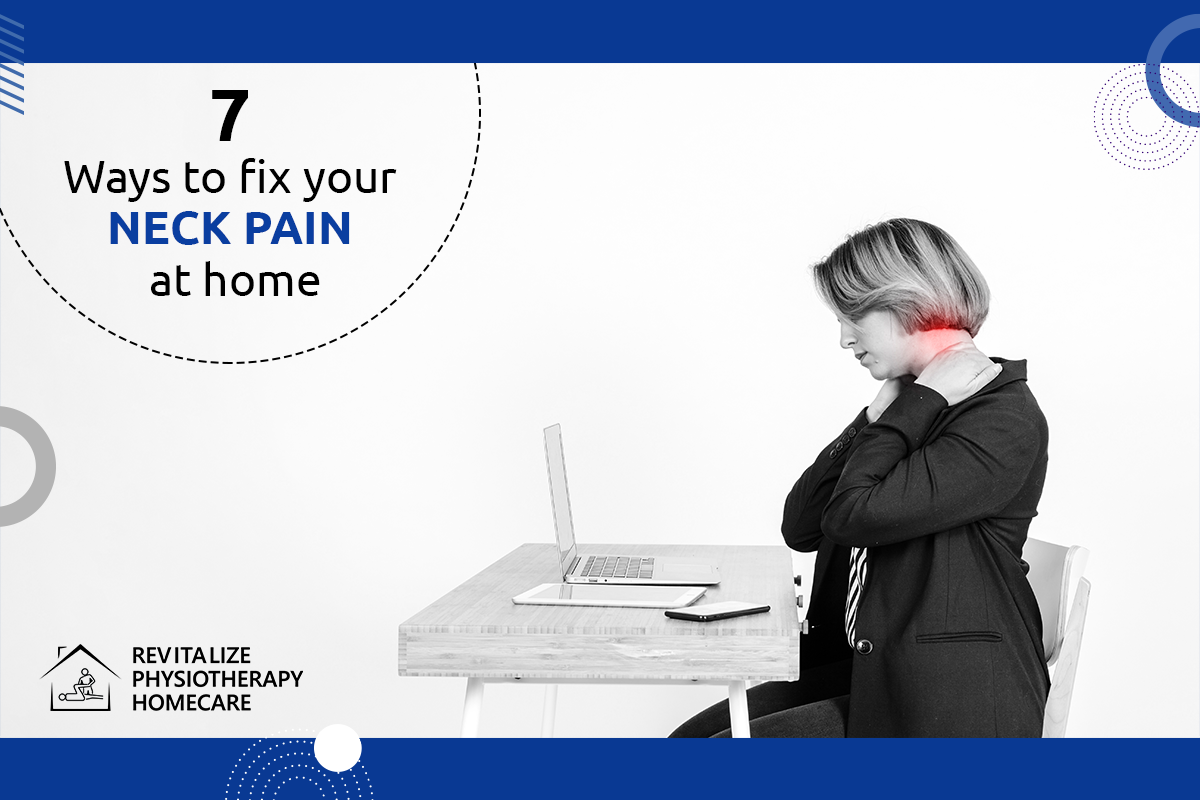7 Ways to fix your neck pain at home
Everyday life can be hard on the neck. It can be possible that you can be familiar with the crick that you feel when you hold your phone between your ears and your shoulder, or the strain you feel after you work at your computer.
Neck pain does not usually develop overnight. It often develops over time. It can be caused by arthritis or degenerative disk disorder. Poor posture, declining muscle strength, stress and lack of sleep may also contribute to the condition.
It's not surprising that neck pain is a common symptom of so many people staring at their phones or looking into computers all day. According to the Centers for Disease Control and Prevention's 2018 National Health Interview Survey , 16.1% of adults had experienced neck discomfort once in a while.
Common causes of neck discomfort:
A stiff neck is a condition where your muscles are weakened by poor posture or misuse of muscles. When the muscle gets pulled then, you will feel immediate pain and your body will create a protective spasm. Because your body doesn't want to get more hurt, it will clench. This will make you feel like you can't move.
The muscles around your neck joints can become tired from looking at the computer monitor all day. The same thing can happen if you drive for a long period and look at your phone all day. Doing this every day can cause your neck to become stiffer.
Neck pain is usually temporary but can develop into something more serious if it is not treated properly. It may make it difficult to get a good night's sleep due to your symptoms.
Neck pain can be caused by many factors. The most common causes for neck pain are:
- Poor posture can cause neck pain and strain if you are unable to stand or sit properly.
- A sudden movement can cause muscle strain.
- Whiplash is a sudden injury that results from an accident.
- Arthritis is a condition that causes inflammation of the neck joints, which can lead to stiffness and pain.
- The neck herniated disk can cause pain, numbness, and tingling.
- Pain and weakness can result from a pinched nerve in your neck.
- Osteoporosis can cause the bones of the neck to become weaker and more vulnerable to fractures. This can lead to pain.
- An emotional stressor can lead to tension in the muscles and nerves of the neck. This can lead to stiffness and pain.
- Rarely, tumors can cause pain or other symptoms in the neck.
If you have persistent neck pain or other symptoms, it's important that you see a healthcare professional.
Treatments and remedies for neck pain:
It is important to rule out infections and injuries. Before you attempt to tackle the problem on your own, it is important to seek professional Brampton Physiotherapist advice.
1. Heat or ice therapy
By lowering blood flow, ice can reduce swelling and inflammation. The opposite happens with heat therapy, it stimulates blood flow.
Ice and heat can be combined to soothe a torn or strained muscle and allow it to heal. These can be used to quickly relieve pain in an area of your body that is overworked, like the neck.
For soft tissue injuries, apply ice for 20 min a few days per day. You should make sure that you have a cold compress to protect your skin from the ice. You can also try a warm shower, a hot bath, or a heating pad.
2. Use over-the-counter pain relievers
OTC pain reliefs are not prescribed and can reduce general pain and inflammation. OTC pain relief includes a class called nonsteroidal-inflammatory drugs. Common NSAIDs like ibuprofen, Motrin, Advil, and naproxen salt (Aleve) can also relieve pain.
Another OTC pain reliever that you can use is Acetaminophen (Tylenol). However, this medication doesn't have any anti-inflammatory properties and can only reduce pain.
These should only be taken as directed by your doctor to avoid any side effects.
3. Avoid sudden movements and stretch
Stretching can relieve stiffness and help prevent future problems. You should stretch gently and make sure to breathe fully in and out. Overstretching or sudden movements can lead to more pain and injury.
Some stretch techniques are used to reduce stiffness in the neck, such as:
- Turn your shoulders in a circle, then roll them backwards and forwards.
- Hold the position for a few seconds by pressing your shoulder blades together. Then, repeat the process.
- Slowly turn your head so that you are comfortable.
4. Seek out a physical therapist (PT)
If you are having trouble regaining strength or mobility after an injury, you must consider consulting a therapist for Neck Pain Treatment Brampton. Physiotherapy is also available to help you with pain management and pain relief. They can also provide exercises that will strengthen your muscles.
A Brampton Physiotherapist will design a treatment plan that is tailored to your specific needs depending on the reason for your stiffness and pain. Regular sessions will be held with your therapist. You can also do the exercises at home as instructed by your therapist. PT exercises are often done at home for a few minutes each day.
5. Chiropractic care is an option
A licensed chiropractor will treat your pain by manipulating your joints and muscles. A chiropractor usually focuses on one area of the body. They can treat anyone, from those recovering from injuries to pregnant women.
Discuss with your doctor whether a chiropractor is the best option for you or not.
6. Try acupuncture
Acupuncture is the practice of inserting needles at pressure points on the body to alleviate stress, tension, or pain. It is a form of traditional Chinese medicines.
While some researchers believe that acupuncture triggers our bodies natural pain relief mechanisms, others believe it creates a placebo effect. However, acupuncture is still a popular holistic treatment option.
Although acupuncture is safe, it is best to consult an expert. Only visit a board-certified practitioner and make sure that the needles are sterilized.
7. Avoid neck pain causing activities
You should stop doing any physical activity if your neck is stiff or hurting.
If you are suffering from neck pain, it is important to limit any heavy lifting or other activities that could aggravate your neck muscles.
You will likely need rest if you have a muscle strain. The injury will determine the ideal time to rest. It may take days or even weeks. A doctor or another healthcare professional can help determine the best time to rest.
Takeaway
Millions of people suffer from neck pain every year. A stiff neck and minor pain can usually be treated at home using ice, OTC pain relief medications, and light stretching.
Lifestyle changes can also help to reduce or prevent neck pain. Take a break from the computer and phone and pay more attention to your posture. If you are constantly waking up with stiff or sore necks, it might be worth changing your sleeping position or buying a new pillow.
If you are looking for the best healthcare or Knee Replacement Clinic Brampton, then book an appointment with us now!




